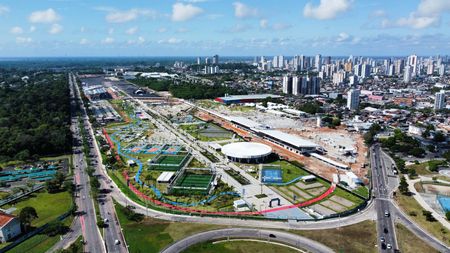By Katy Daigle, Lisandra Paraguassu and Simon Jessop
WASHINGTON/BRASILIA (Reuters) -A group of 35 finance ministers laid out suggestions on Wednesday for scaling climate finance to $1.3 trillion a year, a key demand by developing nations ahead of this year’s COP30 talks in Brazil.
In the first-of-its-kind report, the Circle of Finance Ministers led by Brazil proposes changes to financial areas such as credit ratings, insurance rates, and the lending priorities of development banks.
The 111-page document is meant as a guide for governments and financial institutions to boost the sums available for tackling climate change.
“Every year of delayed climate action raises both the investment needed and the risks faced,” the ministers said in a statement.
But it’s up to each country to decide whether – and how – to use it.
Speaking on the sidelines of World Bank and International Monetary Fund meetings in Washington, Brazil’s Secretary for International Affairs at the Ministry of Finance, Tatiana Rosito, said the report underlined the importance of finance ministers in the discussion.
“We really wanted to mainstream climate and macroeconomic policies,” Rosito told Reuters, noting that finance ministers also serve on the boards of development banks and international funds.
“Finance is usually seen as a hindrance, right? Finance is the main bottleneck,” Rosito added. “I think we can contribute solutions.”
There is currently no plan for the COP30 agenda to include the report, which was launched after last year’s COP29 agreement in Baku. That deal, committing wealthy nations from 2035 to $300 billion in annual climate finance, was criticized by developing countries as too low given that U.N. research suggests that they alone will need at least four times that amount.
The report will be part of the so-called Baku-to-Belem Roadmap, which will include chapters on the environment, indigenous rights and overall efforts to cut climate-warming carbon emissions.
The finance ministers' document was keenly awaited as nations struggle to gauge wealthy countries’ ambition amid the U.S. retreat and the EU juggling concerns about energy security and Russian aggression.
The ministers recommended that countries strengthen regulations for managing risk and for banks to set lending policies based on a project’s risk profile, rather than a country’s.
The report also proposes that carbon markets work through a coalition toward synchronizing their standards to reach a global carbon price.
But the final report weakened some recommendations that were included in an August draft seen by Reuters. The earlier draft's demand that "we need to see external concessional climate finance flows to grow significantly and reach at least $250 billion annually by 2035", was dropped from the final document.
Rosito told Reuters that the ministers spent months consulting with governments and adjusting the advice to ensure it would be relevant and workable for everyone.
MUCH MORE TO BE DONE
The report’s release in Washington, D.C., coincided with pre-COP30 negotiations in Brasilia where more than 70 countries worked to hone the agenda for the November summit.
The delegates agreed to set rules for measuring progress on past goals, including targets for “adaptation” projects aimed at preparing for weather extremes and other climate-driven dangers.
But they did not agree on whether this year’s COP30 should produce a final agreement by all countries. Instead, they could focus on smaller deals that do not need consensus.
“We have made progress towards consensus," COP30 President Andre Correa do Lago told reporters late Tuesday. “There is still much, much more to be done.”
Speakers including Brazil’s Environment Minister Marina Silva reminded countries of their commitment to transition away from fossil fuel, which sparked some protest from fossil fuel-reliant regimes.
Silva dismissed the objections saying the effort to wind down fossil fuel use and reduce emissions “cannot be selective. It has a set of decisions, and all of them need to be treated equally.”
(Reporting by Katy Daigle in Washington, D.C., Lisandra Paraguassu in Brasilia, and Simon Jessop in London; editing by Patricia Reaney)







